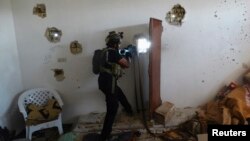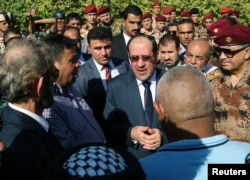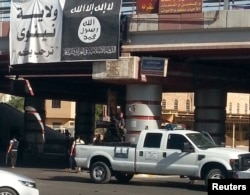State television is working overtime to persuade Iraqis to help Prime Minister Nouri al-Maliki confront an al-Qaida offshoot that has seized wide tracts of the country, but its unifying call has been blunted by his sectarian reputation.
Since the humiliating loss of much of Iraq's north to Islamic State insurgents, the official Iraqiya channel has been churning out patriotic videos of marching soldiers, heavily-armed commandos and even singers and actors to rally the public behind the government.
The theatrics are reminiscent of life under Saddam Hussein, whose propaganda machine put a positive spin on disasters like his 1990 invasion of Kuwait or 1980-88 war with Iran.
Instead of increasing confidence in Maliki, the campaign has highlighted what critics say is the Shi'ite Muslim premier's failure to unite Iraq against Islamist insurgents who have put the country's survival as a unified state in jeopardy.
"We laugh, of course with pain, when the government repeats the same bullshit as Saddam," said Qassim Sabti, a 60-year-old artist.
Mohamed Abdul Jabar al-Shaboot, head of the Iraqi Media Network that broadcasts Iraqiya, said feedback on the videos had been generally good across Iraq's communal spectrum.
"There have been some voices that did not approve of these kind of activities, saying they recalled the patriotic songs that filled TV screens under Saddam Hussein," he told Reuters.
"But there's a big difference because our songs emphasize love of homeland and steadfastness and tolerance while the songs of Saddam's time glorified one person, certified worship of the one and only leader focusing on Saddam's personality."
Still, many Iraqis see Maliki as a polarizing figure who has deepened sectarian divisions, and Iraqiya as his propaganda arm rather than the unifying public service it says it is.
His marginalization of Sunni Muslims has caused some to find common cause with the Islamic State, which aims to reshape the Middle East and impose its radical ideology.
Maliki, who has served in a caretaker capacity since an election in April, has defied calls by Sunnis, Kurds and even some Shi'ites to step aside in favor of a less polarizing leader needed to lead a unified response to the insurgency.
The man who spent years in exile plotting against Saddam seems content to use the same tactics the dictator, a Sunni, employed to create the impression of invincibility.
Impression of invincibility
"Maliki is presenting himself as a national leader pitted against Sunni militants. The message is: if you're against me, you're with the terrorists," said analyst Ramzy Mardini.
"In his mind, now is not the time to compromise and look weak and vulnerable," said Mardini, a non-resident fellow at the Washington think-tank Atlantic Council.
For many, the television clips are a reminder that Iraq's turmoil never seems to let up: war and misadventure under Saddam and now a repeat of the sectarian bloodshed that brought the country to civil war during the U.S. occupation that ousted him.
Since 2003, slick ads demonizing "terrorists" have often been aired. Both state television and pro-government channels have broadcast confessions of captured men, which critics have dismissed as propaganda.
State TV has recently been giving plenty of air time to footage of columns of Iraqi soldiers marching in a Baghdad parade ground near a huge crossed-swords monument to the war with Iran erected by Saddam and left intact by his successors.
While Saddam had a firm grip on his army, Maliki has presided over the decline of the 800,000-strong force built and trained by the United States into a hollow institution riven by corruption and sectarian splits.
Soldiers deserted their posts en masse last month in the cities of Mosul and Tikrit, which fell at an alarming pace to the Islamic State and allied Sunni groups.
Iraqis now see Iranian-trained Shi'ite militias as a powerful force rivaling the military in the ability to challenge the well-equipped, disciplined militants, whose conquests are documented on social media websites.
Iraq's government, meanwhile, has pressed privately-owned media to create the same narrative as state television.
Shortly after Mosul's fall, the official Communications and Media Commission ordered Iraqi media to "focus on the security achievements of the armed forces" and avoid reporting anything that "may be interpreted against security forces."
Such a directive would improperly shield the government from criticism and some private media have complained of being threatened with the loss of their broadcasting licenses if they do not comply, Human Rights Watch said in a July 3 report.
Documented viewing habits of Iraqis are hard to come by, but many among all communities often tune in to non-state satellite channels such as BBC Arabic and al Jazeera where they get a very different take on the news.
Some skepticism, some hope
State television's best efforts to inspire confidence in the country's armed forces are met with skepticism.
One video often broadcast pays tribute to “The Golden Division”, a Shi'ite-dominated anti-terrorism unit under Maliki's command that Sunnis say has targeted their community.
“We are lions ... We are the red death,” croons Mohamed Abdel Jabar, a popular singer known for his romantic ballads.
The pudgy man wearing a uniform to match the commandos twirls a pistol and bounces to the beat as the heavily-armed men march in a crouched position, their weapons cocked.
Still, in an increasingly fragmented country, such images offer hope to some.
A 22-year-old soldier watching traffic in central Baghdad while fiddling with his machinegun said the songs were “a good thing because they motivate us ... Soldiers play them after they pray and before they go attack [militants] and before they storm buildings and carry out raids.”
Abu Abdullah, a 45-year-old electrical engineer, agreed.
“I think a lot of people watch these videos, because the situation is difficult and we need this psychological support. Of course we have no interest in terrorism taking over, we just want our lives to continue,” said Abu Abdullah.
Some, even those involved in the morale-boosting drive, fear that the videos will only stoke sectarian strife.
“These bloody songs are part of the problem and not part of the solution,” said poet Amr Asi Jabar, who wrote the lyrics to “Righteous Men”, one of the songs frequently aired on television since rebels began hanging their black flags on captured land.
Maliki has also tried to fire up Iraqis against the Islamic State during weekly televised addresses to the nation.
But Iraq's top clerics have been much more successful in this respect. In a June 13 speech telecast by Iraqiya, Shi'ite Grand Ayatollah Ali al-Sistani urged Iraqis to take up arms against the Sunni insurgents and tens of thousands, ranging from teenagers to the elderly, heeded his call.
Shaboot said the state network has produced more than 10 videos: “Art and artists are playing an important role in the current battle Iraq is fighting against terrorism.”
But the campaign has not reassured people like Abeer Majid. The Sunni mother of three who works at a central Baghdad travel agency fled Shi'ite Sadr City for the neighborhood of Dora, fearful for her family's safety.
Dora residents say Shi'ite soldiers and militiamen have been conducting random house-to-house searches since the Islamic State's lightning advance in the north, unnerving Sunnis who feel they will pay a heavy price for the insurgency.
“We don't need songs. We need more tangible steps,” said Majid.







